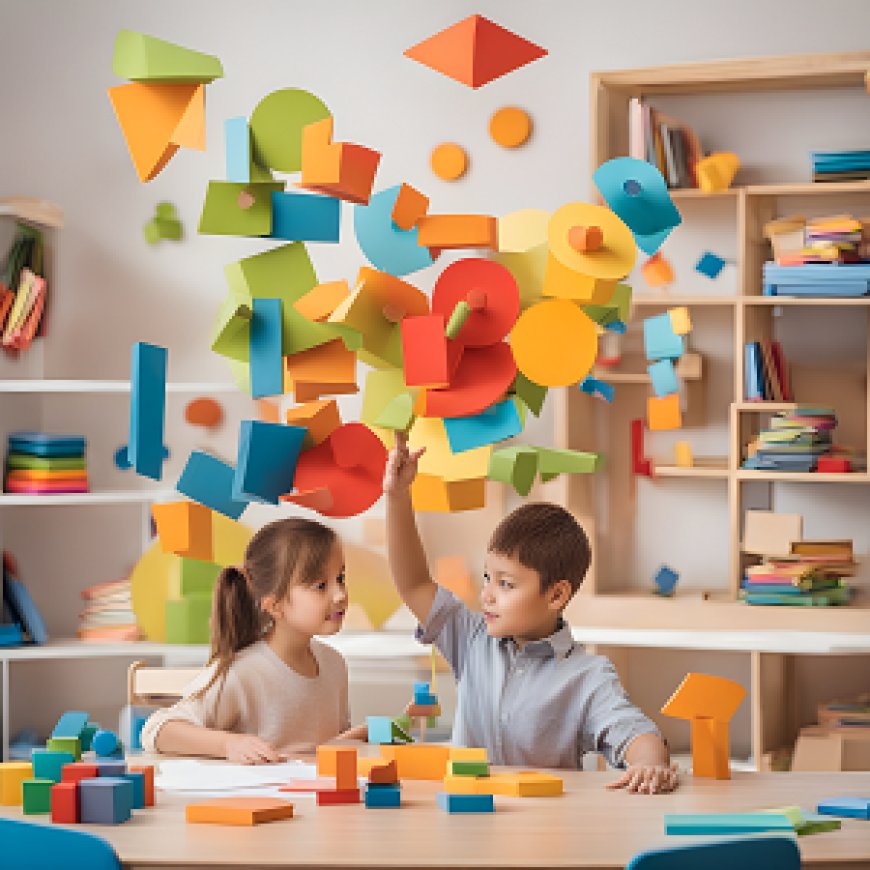Enhancing Problem-Solving Skills for Children: Harnessing Challenges
Enhancing problem-solving skills is one of the most important skills that can be learned and developed in children. Enhancing these skills is crucial in developing children's intelligence and their ability to think critically. Utilizing the challenges and problems that children encounter in their daily lives is a valuable opportunity to develop problem-solving skills. When children learn how to face challenges and seek solutions to problems, they gain greater self-confidence and become more independent. Developing these skills enables them to think creatively and find innovative solutions to the various challenges they encounter in different aspects of their lives.

Learning and skill development are not easy tasks, but they are among the most important challenges that parents and caregivers face in raising children. Among these skills that need special emphasis are problem-solving skills. Problem-solving is one of the key tools that enable children to deal with challenges and difficulties in their lives. Understanding how to enhance problem-solving skills for children and how to help them benefit from challenges plays a crucial role in developing their intellectual and social abilities.
Children are naturally fascinated by the world around them, and they gradually discover that there are challenges and problems they must confront and solve. In this context, it becomes essential to equip them with tools and skills to deal with these challenges. Therefore, the development of problem-solving skills in children should be an integral part of the educational program.
The Importance of Developing Problem-Solving Skills in Children
Developing problem-solving skills in children is a fundamental element in their personal development and achieving success in various aspects of life. Learning how to deal with challenges and solve problems gives children the ability to think critically and make appropriate decisions. These skills can open doors for children to succeed in education, work, and personal relationships.
Development of problems solving skills for children is of great importance and can be summarized in the following points:
-
Promoting Independence: Problem-solving skills enable children to deal with problems and difficulties independently without the constant need for adult assistance. This contributes to enhancing their independence and their ability to achieve goals on their own.
-
Boosting Self-Confidence: When children learn how to confront challenges and successfully solve problems, it increases their confidence in themselves. They feel empowered and capable of handling difficult situations.
-
Enhancing Critical Thinking Skills: Problem-solving requires precise analysis and evaluation of available options. Developing these skills can positively impact children's performance in school and their daily lives.
-
Fostering Creative Thinking: When children face a problem, they have the opportunity to search for innovative solutions and think outside the box. This promotes the development of creative thinking.
-
Improving Social Relationships: If children can solve problems and handle conflicts constructively, it contributes to improving their relationships with others and avoiding conflicts.
-
Enhancing Self-Development: When children learn how to overcome difficulties and succeed in problem-solving, it fosters their personal growth and emotional and social development.
-
Benefiting from Growth Opportunities: Problems and challenges are opportunities for learning and growth. They enable children to develop their skills and experiences by facing these challenges.
In summary, developing problem-solving skills in children has a positive impact on their personal and professional lives in the future. It enables them to face challenges with confidence and independence, fostering their growth as thoughtful and creative individuals.
Fostering Creative Thinking and Independence
Problem-solving skills are a powerful tool for promoting creative thinking and independence in children and youth. When children learn how to deal with challenges and problems in innovative ways, they develop the ability to innovate and find new solutions to problems. This can boost their self-confidence and independence, enabling them to make their own decisions and achieve their goals effectively.
Children's Benefit from Challenges and Difficulties
Challenges and difficulties are essential parts of children's development and growth. When children are faced with problems and difficulties in their developmental stages, it can have a significant positive impact on their problem-solving skills. When children confront challenges, they have the opportunity to develop their skills in creative thinking and innovating new solutions. These experiences help them build self-confidence and enhance their independence. Children can learn how to deal with pressures and challenging situations and turn them into opportunities for growth and development.
Challenges and difficulties are an integral part of children's lives and their growth. These confrontations are considered opportunities for children to develop problem-solving skills and personal growth. Here are some points that contribute to understanding how children can benefit from these challenges:
-
Promoting creative thinking: When faced with difficulty or challenge, children learn how to search for innovative solutions and find new ways to deal with problems.
-
Developing analytical skills: Through exposure to challenges, children learn how to analyze the situation and break the problem down into smaller, manageable parts.
-
Boosting self-confidence: When children overcome a difficulty or challenge, it increases their self-confidence and encourages them to face future challenges with confidence.
-
Learning to use resources: Children can learn how to search for available resources and use them to solve their problems.
-
Enhancing independence: When children learn how to handle challenges independently, they become more self-reliant and capable of dealing with difficult situations.
-
Promoting personal development: Challenges contribute to the personal development of children and enhance their emotional and social growth.
-
Learning resilience: Resilience is an important skill that children can learn through dealing with challenges. They learn how to persevere and continue trying until they achieve success.
In summary, children can greatly benefit from challenges and difficulties by developing problem-solving skills and personal growth. Putting effort into overcoming challenges can have a positive impact on their development and growth.
The Role of Parents in Enhancing Children's Problem-Solving Skills
Parents play a crucial role in developing and enhancing problem-solving skills in children. Here are some ways in which parents can contribute to the development of these skills:
-
Providing a supportive environment: Parents should create an environment that encourages creative thinking and innovative solutions. This can be achieved by offering educational toys and thought-provoking materials.
-
Encouraging critical thinking: Parents can encourage children to ask questions and seek constructive answers. This helps in developing analytical and critical thinking skills.
-
Offering guidance and support: When children face difficulties in problem-solving, parents should provide guidance and support. They can direct them towards different problem-solving strategies and engage with them in the process of finding solutions.
-
Promoting learning from mistakes: Parents should encourage children to experiment and test different solutions, even if they fail. Mistakes can be opportunities for learning and improvement.
-
Fostering independence: Parents can motivate children to attempt problem-solving independently and not rely solely on them. This contributes to building self-confidence and acquiring effective problem-solving skills.
Conclusion
Problem-solving skills have a significant importance in the development of children and in preparing them to face challenges in their lives. When children learn how to think systematically and constructively when dealing with problems, they become capable of achieving success in many areas. They acquire the ability for critical thinking, making sound decisions, and learning how to collaborate with others to solve both small and large problems.
Furthermore, developing problem-solving skills can help children enhance their understanding of the world around them and promote their intellectual abilities. Not only that, but it can also make challenges and difficulties a source of inspiration for growth and personal development.
In conclusion, enhancing problem-solving skills for children represents a fundamental investment in their future, enabling them to excel in their studies and succeed in life. Parents and caregivers should be supportive and encourage them to face challenges with confidence and determination, thus preparing them to embrace their future with confidence and positivity.
What's Your Reaction?





































































































































































